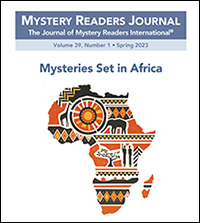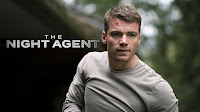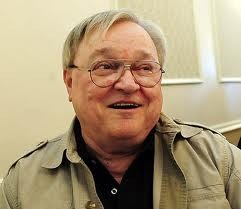MIKE LAWSON is a former senior civilian executive for the U.S. Navy. He is the author of fifteen novels starring Joe DeMarco, three novels with his protagonist Kay Hamilton, and one standalone novel Redemption.
Pages
Friday, March 31, 2023
LOOKING BACK: Guest Post by Mike Lawson
Thursday, March 30, 2023
BIRTHDAY CRIME FICTION: Happy Birthday to me!
Birthday Crime Fiction
A Birthday to Die For by Frank Atchley
Cranberry Crimes by Jessica Beck
Birthdays Can be Deadly by Cindy Bell
The Birthday Murderer by Jay Bennett
Birthday Can Be Murder by Joyce Cato
Two Little Girls in Blue by Mary Higgins Clark
Berries and Birthdays by Leena Clover
A Catered Birthday Party by Isis Crawford
The Birthday Gift by Ursula Reilly Curtiss
The Birthday Party: Family Reunions Can Be Murder by Chari Davenport
The Whole Enchilada by Diane Mott Davidson
The Party by Elizabeth Day
The Birthday Girl by Melissa De La Cruz
There's Something about Mary by Wendy Delaney
A Birthday Secret by Nickolas Drake
Murder Can Botch Up Your Birthday by Selma Eichler
Birthday Cake and Bodies by Agatha Frost
Birthday Sprinkle Murder by Susan Gillard
Aunti Poldi and the Sicilian Lions by Mario Giordano
The Nanny by Dan Greenburg
The Happy Birthday Murder by Lee Harris
They Found Him Dead by Georgette Heyer
Birthday Cake Waffle by Carolyn Q. Hunter
Birthday Girl by Matthew Iden
Death in the Garden by Elizabeth Ironside
Happy Birthday, Marge by Shari Hearn
The Birthday Treasure Mystery by Kaylee Huyser
Birthday Party by Marne Davis Kellogg
Murder with a Twist by Tracy Kiely
Birthday Party by C.H.B Kitchin and Adrian Wright
Spiced by Gina LaManna
The Birthday Murder by Lange Lewis
Creme Brulee Murder by Harper Lin
The Old Die Young by Richard Lockridge
The Birthday Killer by W. Kay Lynn
Birthdays for the Dead by Stuart McBride
The Birthday Mystery by Faith Martin
The Birthday Party by Laurent Mauvignier
Birthday Party Murder by Leslie Meier
Deadly Birthday by CT Mitchell
Many Deadly Returns by Patricia Moyes
The Body in the Casket by Katherine Hall Page
21st Birthday by James Patterson
Birthday, Deathday; The Cannibal Who Overate by Hugh Pentecost
The Birthday Club by Jack Peterson
Murder and Meringue Cake by Rosie A. Point
The Birthday Party by W. Price
Birthday Dance by Peter Robinson
Birthdays are Murder by Cindy Sample
The Birthday Bash by Elizabeth Sorrells
Don't Scream by Wendy Corsi Staub
Birthday Cake and a Murder by Kathleen Suzette
Fear in the Sunlight by Nicola Upson
The Birthday Present by Barbara Vine
Cakes for Your Birthday by C.E. Vulliamy
A Birthday Lunch by Martin Walker
The Birthday Girl by Sarah Ward
 |
| HAPPY BIRTHDAY! |
The Mortician's Birthday Party by Peter Whalley
Birthday Girl by Niko Wolf
The Fortieth Birthday Body by Valerie Wolzien
The Birthday by Carol Wyer
The Birthday by Margaret Yorke
Short Story:
"The Birthday Dinner" by Donna Andrews in Death Dines In, edited by Claudia Bishop & Dean James
Children's:
Cam Jansen and the Birthday Mystery by David A. Adler, Illustrated by Susanna Natti
Wednesday, March 29, 2023
SISTER BONIFACE, Season 2
Sister Boniface, a spin-off of the Father Brown series, is set for Season 2 to premiere on April 4th on Britbox in the U.S. There will be 10 episodes in Season 2.
Sister Boniface is played by Lorna Watson. This light-hearted series is set in the 1960s and stars Sister Boniface, a genius with a PhD in forensic science. She is an official Police Scientific Advisor working with DI Sam Gillespie and DS Felix Livingstone, advising them on all things forensic. Sister Boniface rides a moped, makes wine, and is a part time forensic scientist with the police. All this while living the 'contemplative' life, sort of. She does, though, really champion the victims and wants to see justice served.
Tuesday, March 28, 2023
The Great Detective: Ten Ways Holmes Influenced the Mystery Genre: Guest Post by Amber M. Royer
Monday, March 27, 2023
THE NIGHT AGENT: Netflix TV series
Here's what Matthew Quirk says about The Night Agent on Netflix:
The series is available on Netflix worldwide.
It's a fast-paced Die Hard-style story with a bit of a locked-room mystery element and has some characters I really love. The book also offers a look inside a very cool real-life government facility called Raven Rock, which is the secret "undisclosed location" America's leader go to for protection. It's available for pre-order.
Sunday, March 26, 2023
K.C. Constantine: R.I.P.
Carl Constantine Kosak died on March 23. Carl, using the pseudonym K.C. Constantine was one of the most distinguished writers of crime fiction of the past half-century. His first book, The Rocksburg Railroad Murders, was published in 1972 by the noted literary house David R. Godine, and he continued to write until his unexpected death in mid-March. He recently completed work on Another Day’s Pain, scheduled to be published early next year by The Mysterious Press, which had published ten of his books including Joey’s Case, the nominee for an Edgar award by the Mystery Writers of America as the best book of the year (1988). The character-driven Constantine novels provide a powerful and poignant view of a dying central Pennsylvania town in a starkly realistic light. Carl is survived by his son Chris Kosak, his daughter-in-law Joy Kosak, and his three treasured grandsons, Cole, Alexander and August Kosak all of Moraga, California.
Saturday, March 25, 2023
RITA LAKIN: R.I.P.
Friday, March 24, 2023
And They Say Crime Doesn’t Pay? Guest Post by Stefán Máni
Thursday, March 23, 2023
ENDEAVOR: FINAL SEASON: PBS Masterpiece
The spinoff series inspired by Inspector Morse comes to a brilliant end as Shaun Evans as the young Morse and Roger Allam as his superior officer face baffling new crimes and an unsolved case from the past. With characters from former seasons popping up in a grand finale, Morse must resolve his professional and romantic future. The London Times praised the final episodes as “classy, poignant.”
LIVING IN A BOOKSTORE: Guest Post by Cathy Pickens
Wednesday, March 22, 2023
VERA NEWS
Kenny Doughty announced he is leaving ITV drama Vera after eight years.
He continued:
Tuesday, March 21, 2023
MYSTERIES SET IN AFRICA: Mystery Readers Journal (39:1)
 If you're a PDF subscriber, you will receive download
instructions shortly. Hard copy subscription copies should arrive by early next week. International subscribers will receive their issues within two weeks. PDF Contributor copies will go out in the next few days. Thanks to everyone who contributed to both of these great issues.
If you're a PDF subscriber, you will receive download
instructions shortly. Hard copy subscription copies should arrive by early next week. International subscribers will receive their issues within two weeks. PDF Contributor copies will go out in the next few days. Thanks to everyone who contributed to both of these great issues.Buy this back issue! Available in hardcopy or as a downloadable PDF.
ARTICLES
- Eugene P.A. Schleh: The Mysteries of Africa by Aubrey Nye Hamilton
- Agatha in Africa by Kate Derie
- Cape Town Crime Fiction by Eric Beetner
- John V. C. Wyllie and Dr. Samuel Quarshie by Aubrey Nye Hamilton
AUTHOR! AUTHOR!
- Taking My Imagination on Safari by Annamaria Alfieri
- From Scandi Crime to Sandy Crime by Parker Bilal
- I Was Already a Spy, I Might as Well Write About It by Bryan Christy
- Rift — A Novel About a Journey That Is Still on My Mind by Liza Cody
- Green Snake in Green Grass by Kathy Curnow
- Nkisi by Russell Hill
- A Brutal Love Letter by Akbar Hussain
- Memories of my Father’s Bookshelf by Sylva Nze Ifedigbo
- Corruption in Kenya—The Mystery Is in the Details by Gerald Everett Jones
- Writing on the Continent of Light by Deon Meyer
- A Trip to Egypt by Erica Ruth Neubauer
- My Mystery Writing Life by Stella Oni
- Le Petit Senegal by Paul R. Paradise
- Adventure and Romance in North Africa by Neil S. Plakcy
- From Your Armchair to the Gulf of Guinea: The Case for the African Mystery by Kwei Quartey
- Murder in Africa by Bryony Rheam
- Death by Natural Causes: Creating an African Cozy Short Story by Merrilee Robson
- Vacation, Vacation, Vacation by Wendall Thomas
- Serious Research in Africa by Michael Stanley (Stanley Trollip)
- Africa: The Most Interesting Place I’ve Never Been by N. S. Wikarski
COLUMNS
- Mystery in Retrospect: Reviews by Eric Beetner, Aubrey Nye Hamilton, Sandie Herron, Kathy Boone Reel, L.J. Roberts, Craig Sisterson, and Lucinda Surber
- Children’s Hour: African Mysteries by Gay Toltl Kinman
- In Short: Africa by Marv Lachman
- From the Editor’s Desk by Janet A. Rudolph
The Popular Culture Association: George N. Dove Award
Congratulations, Martin Edwards, for receiving the Popular Culture Association (U.S.) George N. Dove Award. The stated mission of the PCA is 'to promote the study of popular culture throughout the world through the establishment and promotion of conferences, publications, and discussion. The PCA actively tries to identify and recruit new areas of scholarly exploration and to be open to new and innovative ideas. PCA is both inter-disciplinary and multi-disciplinary. Finally, the PCA believes all scholars should be treated with dignity and respect.'
Sunday, March 19, 2023
LEFTY AWARD WINNERS 2023: LEFT COAST CRIME
Lefty Award Winners: Left Coast Crime 2023
The Lefty Awards were announced last night at the Left Coast Crime Convention in Tucson, Arizona. Congratulations to all!
- Ellen Byron, Bayou Book Thief (Berkley Prime Crime)
(The Bill Gottfried Memorial) for books set before 1970
- Wanda M. Morris, Anywhere You Run (William Morrow)
- Ramona Emerson, Shutter (Soho Crime)
(not in other categories)
- Kellye Garrett, Like a Sister (Mulholland Books)
Saturday, March 18, 2023
Thriller Award Nominees 2023: International Thriller Writers
• The Violence, by Delilah S. Dawson (Del Rey)
• Things We Do in the Dark, by Jennifer Hillier (Minotaur)
• The Fervor, by Alma Katsu (Putnam)
• The Children on the Hill, by Jennifer McMahon (Simon & Schuster)
• Two Nights in Lisbon, by Chris Pavone (MCD)
• Sundial, by Catriona Ward (Macmillan)
Best Audiobook:
• Young Rich Widows, by Kimberly Belle, Fargo Layne, Cate Holahan, and Vanessa Lillie; narrated by Dina Pearlman, Karissa Vacker, Helen Laser, and Ariel Blake (Audible)
• The Lies I Tell, by Julie Clark; narrated by Anna Caputo and Amanda Dolan (Audible)
• The Photo Thief, by J.L. Delozier; narrated by Rachel L. Jacobs and Jeffrey Kafer (CamCat)
• Things We Do in the Dark, by Jennifer Hillier; narrated by Carla Vega (Macmillan Audio)
• The Silent Woman, by Minka Kent; narrated by Christine Lakin and Kate Rudd (Blackstone)
Best First Novel:
• The Resemblance, by Lauren Nossett (Flatiron)
• Blood Sugar, by Sascha Rothchild (Putnam)
• Dirt Creek (aka Dirt Town), by Hayley Scrivenor (Flatiron)
• A Flicker in the Dark, by Stacy Willingham (Minotaur)
• The Fields, by Erin Young (Flatiron)
Best Paperback Original Novel:
• The Lies I Told, by Mary Burton (Montlake)
• No Place to Run, by Mark Edwards (Thomas & Mercer)
• Unmissing, by Minka Kent (Thomas & Mercer)
• The Housemaid, by Freida McFadden (Grand Central)
• Anywhere You Run, by Wanda Morris (Morrow)
• The Couple Upstairs, by Holly Wainwright (Pan Macmillan)
• The Patient’s Secret, by Loreth Anne White (Montlake)
Best Short Story:
• “Russian for Beginners,” by Dominique Bibeau (Ellery Queen Mystery Magazine [EQMM], March/April 2022)
• “The Gift,” by Barb Goffman (from Land of 10,000 Thrills, edited by Greg Herren; Down & Out)
• “Publish or Perish,” by Smita Harish Jain (EQMM, September/October 2022)
• “33 Clues Into the Disappearance of My Sister,” by Joyce Carol Oates (EQMM, March/April 2022)
• “Schrödinger, Cat,” by Anna Scotti (EQMM, March/April 2022)
• “Stockholm,” by Catherine Steadman (Amazon Original Stories)
Best Young Adult Novel:
• Our Crooked Hearts, by Melissa Albert (Flatiron)
• Sugaring Off, by Gillian French (Algonquin Young Readers)
• Daughter, by Kate McLaughlin (Wednesday)
• What’s Coming to Me, by Francesca Padilla (Soho Teen)
• I’m the Girl, by Courtney Summers (Wednesday)
Best E-Book Original Novel:
• Evasive Species, by Bill Byrnes (Self-published)
• The Couple at Causeway Cottage, by Diane Jeffrey (HarperCollins)
• The Seven Truths of Hannah Baxter, by Grant McKenzie
(Self-published)
• The Hollow Place, by Rick Mofina (Self-published)
• Fatal Rounds, by Carrie Rubin (Self-published)
Charlaine Harris and Walter Mosley will receive 2023 ThrillerMaster Lifetime Achievement Awards. Minotaur Books was named the winner of the 2023 Thriller Legend Award.
Winners will be announced on Saturday, June 3, during ThrillerFest XVIII, in New York City.























